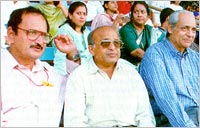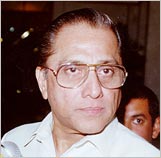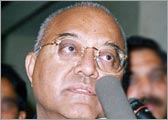Wanted, an encore
Prem Panicker
'Hey, Prem,' said the voice on the phone early this morning, 'did you read the Indian Express story? Don't you have anything to say?'
Actually, when the call came, I wasn't even awake. Now, I am.
In the interim, I got, and perused, the full report filed by the CBI. Even as I was doing that, and helping to put it up in its entirety on the site, more emails -- can we have the highlights, and a quick analysis, please?
The highlights are obvious, and have in fact been talked of on this site, and in other media, these past few days:
1) Mohammad Azharuddin is now, by his own words, proved guilty of match-fixing.
2) Ajay Jadeja has denied all knowledge and involvement. The CBI for its part has ripped open that facade, and clearly indicted him on the same charge (I wonder, in passing, whether the political storm sought to be raised by Jaya Jaitley, who accused the CBI officials of misbehaviour, over-eating (??!!) and demanding bribes, prompted the agency to be especially thorough in his case?)
3) Nayan Mongia stands indicted, if only because his partner in crime, Azharuddin, has openly named him as an accomplice.
Those, in essence, are the highlights. But it is the aftermath that raises interesting questions.
For instance, I am curious to know what punishment will now be meted out to those named. The CBI indicates that there is no provision to punish, since cricketers are not public servants and therefore do not come under the provisions of the Anti Corruption Act. Which, I think, is a ridiculous situation -- we have an act against corruption, which does not include 99.99 per cent of the citizens in this country in its ambit? Players who fly the Indian flag, who represent this country in sporting arenas around the world, sell out the country and its people, trade India's cricketing aspirations in for money, and the law can do nothing? That is as damning an indictment of our archaic, outdated laws and our law-makers as any I know.
But wait -- did the ICC not say that any player found guilty of match-fixing will have his name erased from the record books? And was the BCCI not a party to that decision?
We tried to find out if the BCCI will implement that particular edict in this case. You know what we got?
"We have appointed former director of the CBI Mr Madhavan to head the BCCI's anti-corruption cell. He will study the CBI report, and then advise us on the implications, and what action to take," from board president Dr A C Muthaiah.
Huh?
 But that is nothing to what our perennial favourite, Jaywant Lele, came up with when Faisal Shariff spoke to him just now. "There is no match-fixing in India. We have two or three rotten apples, but that s not match-fixing! No, I have nothing further to say, I haven't read the report!'
But that is nothing to what our perennial favourite, Jaywant Lele, came up with when Faisal Shariff spoke to him just now. "There is no match-fixing in India. We have two or three rotten apples, but that s not match-fixing! No, I have nothing further to say, I haven't read the report!'
Permit me to pause for a sigh. Lele, secretary of the body that runs Indian cricket, has not read the report. Neither, interestingly, has his boss, Board President Muthaiah. Whereas the rest of the country has read, digested, and responded to it. Strange, isn't it, that the two top officials of the BCCI, the body that governs Indian cricket, are at this point in that miniscule minority of people who are yet to read the report?
Obviously, a little thing like match-fixing is not a priority for those gentlemen.
Moving on, what now from the ICC and its supercop, Paul Congdon? Various bookies have named a crop of international players including England's former skipper Alec Stewart, West Indies' former skipper Brian Lara, New Zealand's former skipper Martin Crowe, Australia's premier batsman Mark Waugh, Sri Lankan stars Arjuna Ranatunga and Aravinda D'Silva, and others. In some cases, details of monies paid and services rendered have also been mentioned. Now then, will the ICC announce an immediate investigation into these charges? Or will it do nothing, and in so doing, further erode its credibility?
But more than all of the above, what intrigues me is a line in the CBI's media statement. "We have not closed the case, we will investigate further as and when fresh evidence is presented."
Fresh evidence? Let's try making a start, here. I don't want to reiterate, at extreme length, matters that have already been spoken of. Yet, I am only too well aware of how short public memory can be. So, for those who need the aides memoire, here is a collection of links that tell various aspects of the tale:
The Chandrachud report analysis
More on Chandrachud
War!
Future tense
The Champions' Trophy match reports -- pay special attention to India's first and third games in the series
Night of the Long Knives
Sachin sacked, Azhar back
One day mataram!
Ramakanth Desai, Rest in Peace!
The lost Emperor
The Captaincy Conundrum
Azhar finally crosses the line
The above, in sum, present a scary picture. Of deliberate collusion by board presidents, secretaries, selection committees and sundy other officials, all aimed at perpetuating the presence of Mohammad Azharuddin in the Indian side. Often, at the expense of the side itself.
 One captain, and arguably one of the best players produced by this country, was reduced to a nervous wreck by their antics. One former Test player, turned captain of selectors, was hurried into an early grave. And for five, six years, the board officials shed crocodile tears at India's lack of cricketing success, while actively ensuring that such success would never attend our efforts -- I mean, in the pressure cooker world of international cricket, top teams find that when 11 good players play their hearts out, there is still no guarantee they will win. And India, effectively reduced to playing with 8 players, was supposed to produce results? Hah!
One captain, and arguably one of the best players produced by this country, was reduced to a nervous wreck by their antics. One former Test player, turned captain of selectors, was hurried into an early grave. And for five, six years, the board officials shed crocodile tears at India's lack of cricketing success, while actively ensuring that such success would never attend our efforts -- I mean, in the pressure cooker world of international cricket, top teams find that when 11 good players play their hearts out, there is still no guarantee they will win. And India, effectively reduced to playing with 8 players, was supposed to produce results? Hah!
These issues, dealt with in depth in the articles referred to above, raise a plethora of questions and suspicions, that need to be answered urgently.
Question: Why have the likes of Jaywant Lele and Jagmohan Dalmiya consistently denied the existence of match-fixing in India? Why does a Lele continue to deny it even today?
Question: How was the Justice Chandrachud Commission appointed? Who orchestrated that monumental cover-up, and why?
Question: Who were the national selectors who, during the tenure of Sachin Tendulkar, plotted to replace him with Mohammad Azharuddin, and why? (The existence of such a plot was in fact leaked to the media by a member of the selection committee, as mentioned in one of the reports referred to above).
Question: Why, on two different occasions, did the national selectors show an unholy rush to bring back Mohammad Azharuddin as captain -- on one occasion, just a week after summoning him to a disciplinary hearing?
Question: What is Raj Singh Dungarpur's role in the affair? He was the man who first made Azharuddin captain, completely out of the blue. He was the man who, during his tenure as board president, personally intervened to stop the national selectors from deposing Tendulkar and replacing him with Azharuddin -- and then, a short while later, swung to the other extreme, and personally ensured that Azharuddin would take over from Tendulkar. What caused the turnaround?
Our first reaction, on seeing the CBI report, is to breathe a sigh of relief. Ah, we think, at last, no sign of cover-up. At last, the guilty are being publicly named (while on that, Prime Minister Atal Bihari Vajpayee deserves a huge round of applause, for publicly stating that the entire report should be released immediately, for the edification of the general public).
But cynicism has been bred into us of late. And that is why that first sigh of relief is immediately followed by a deeper sigh, of weariness, disgust, frustration.
Why? Because after all this, there is still no guarantee that Indian cricket will not breed further Azharuddins, Jadejas, Mongias, etc. Because the conditions that created an Azharuddin, a Jadeja, still exist in Indian cricket administration.
What does the CBI say, when it talks of the board? That corruption was bred into the system by the board's insistence on sending the team to play masala matches around the world, often at the expense of Tests. In that context, do you find a certain situation strange? Namely, that India as per its contract with the CBFS, is expected to play in Sharjah once a year -- but the board has voluntarily agreed to send India for two fixtures a year, as against the contracted one.
Why? Who decided that?
 In these columns, we have often referred, in scathing terms, to the board's cosying up to Sharjah and Bangladesh. Lo, the CBI in its report poses another valid question -- why is it that in the case of these two venues, the board, which otherwise looks to milk as much money as possible, choses to deliberately undersell itself? Thus: For the ICC Wills Cup in 1998, the hosts Bangladesh received, by way of television revenues for the Indian region alone, a sum of Rs 35 crore. How much of that did the board get by way of guarantee money? Rs 46 lakhs.
In these columns, we have often referred, in scathing terms, to the board's cosying up to Sharjah and Bangladesh. Lo, the CBI in its report poses another valid question -- why is it that in the case of these two venues, the board, which otherwise looks to milk as much money as possible, choses to deliberately undersell itself? Thus: For the ICC Wills Cup in 1998, the hosts Bangladesh received, by way of television revenues for the Indian region alone, a sum of Rs 35 crore. How much of that did the board get by way of guarantee money? Rs 46 lakhs.
For the 1998 Sharjah tournament (one of the many Coca Cola Cups played at that venue), the corresponding amount received as television rights for India alone was Rs 17 crore. The board's share? Rs 68 lakh.
Does something smell rotten in the state of Denmark?
"These figures," says the CBI in its report, "are self-explanatory and indicate that India has undersold itself due to reasons not satisfactorily explained by BCCI office-bearers during their examination by the CBI".
“Although there is no direct evidence to suggest the involvement of any board members in match fixing, their ‘resolute indifference’ does give rise to a suspicion ‘that there was perhaps more than meets the eye.’ It defies credulity to believe that the apex body was oblivious to such rampant match fixing and therefore did not find the need to investigate thoroughly the results of matches which are patently questionable,” the report says.
"In conclusion," reads the part of the report that deals with the BCCI, "the BCCI has been negligent in not preventing match-fixing and related malpractises in cricket in spite of clear signals about the malaise. This is mainly due to the fact that for most office bearers of the BCCI, running the board is an end in itslef and the future of cricket is only incidental."
In the face of such a damning indictment, any self-respecting official(s) would resign, immediately. What does Muthaiah do? He rants and he raves. “I strongly protest over the CBI’s remark that the BCCI was aware of such things. I have not seen the report and am expecting to get it in a day or two. But I would like to make it clear that none of the BCCI officials were aware of match fixing.”
Huh? Muthaiah needs to wait for two days to get a report anyone can get merely with a few mouse clicks? Or failing that, the report in hard copy was released around noon today -- how long does it take for 162 pages to be faxed from Delhi to Chennai? Or Baroda?
All it would have taken was for the BCCI boss to call someone in the Delhi cricket association, and ask for the report to be faxed (Raj Singh Dungarpur asked us, this evening, for a copy). To do so, though, you should be actuated by concern. A desire to know, so that you can begin to think of the remedial measures required. Such a desire, obviously, is not felt by the two seniormost board officials. Rather, this is a nice chance to stall -- 'We haven't got the report, we have to first get it, then read it, then understand it, then consult legal experts, you know these things take time...'
Anyways. Without having read it, he protests the CBI remarks?
So much for any hope of board officials owning its responsibility, and resigning.
And that leaves only one hope left -- that the CBI, having dealt with the players for now, will turn its undivided attention on the officials.
Because one thing is for sure -- merely removing an Azhar, a Jadeja, a Mongia will not end the cancer. Because it is not localised, but has permeated through the body of Indian cricket.
And for such an all-pervasive disease, only the most drastic cure will do.
Postscript: In fact, two postscripts. Did you read that bit in the report about Delhi's Ranji team throwing a match because some of its players would far rather lose a domestic fixture, than jeopardise their chances of playing on the English county circuit? That is as startling an example as any you need, to show you how completely we have devalued domestic cricket in this country.
And secondly, you know what? There is some more light at the end of what seemed a never-ending tunnel. And that light will appear within the next few weeks, when the second report -- this one, dealing with the issue of allocation of television rights -- comes out. Watch for that, it promises to be a blockbuster.
Prem Panicker
Mail Prem Panicker